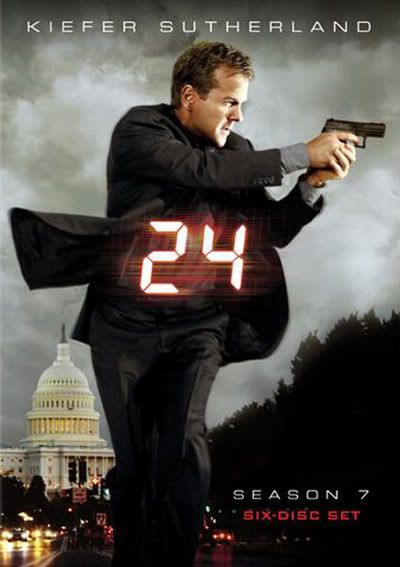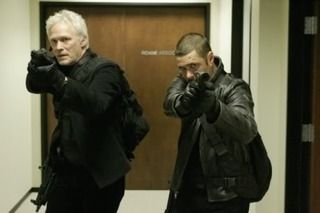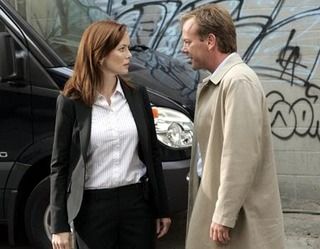
I’ve been a fan of the television series 24 since it’s inception. But, over the years, I have remained one of the loyalists who do not simply watch the show on the air, but one who watches the ENTIRE season in one session when it arrives on DVD. In fact, I mentioned this in passing once to Dennis Haysbert, better known as President David Palmer, who merely told me, “Yea. There are a lot of you.” It is a fan fraternity that I am proud to a part of. 24 comes by once a year like Christmas and every year, it never fails to disappoint.
Season 7 moved the action to Washington, unless you’re from Los Angeles, in which case you would recognize most of the shooting locations for a lot of exteriors. Of course, to really enjoy the series calls for a much greater suspension of disbelief, so that should not ruin the show for anyone. After six years of Jack’s previous exploits, we find him facing a Congressional committee for his methods, which have now been deemed ‘torture.’ As even the ghost of Harry Caray will tell you, everyone knows that torture is wrong, but Jack is willing to face the consequences of his actions. Before the committee can really get underway in their questions, Jack is pulled from the hearings by the FBI, in order to help with a terror threat facing the country.
From there, the story takes us through its familiar refrain of twists and turns, deceptions and decoys, people deep undercover on both sides and working towards their own ends for both personal and professional reasons. As someone who hates procedurals, I wonder how I enjoy 24 year after year, since it is as formulaic as any cop show on CBS. They never reinvent the wheel on the show, they just continue to do it in a manner that is different every year and always pulls you in with Kiefer's intense portrayal of Jack Bauer. This season really test his mettle in purely sociopolitical terms. Since being off the air for nearly two years because of the writer's strike, the nation which required a hero like Jack is much different today. We elected a President who is staunchly against torture, closed Guantanamo Bay and even call out authorities accused of racial profiling. In this year of the show, Jack faces a system that desperately needs his help, but feels compelled to pull him back when he does what is necessary. Torture is wrong, but unfortunately, Jack is always right. Only one person in the history of the show has been tortured when they were not somehow involved in a plot against the country and Jack was not the person who did it. Jack Bauer is a hero to most Americans because he can do what we cannot bring ourselves to do. He lives to serve us, will follow our rules and submit to our punishment, but he does it all for the American people. Still, his moral dilemma was not the highlight of this season.
The best part of this year was Annie Wersching as FBI agent Renee Walker. Like famous G-Men Eliot Ness and Melvin Purvis before her, Agent Walker finds herself slowly realizing that everything she knows to be true is false and people like Jack Bauer are necessary to stopping the people who do this country harm. She starts off by puling Jack into the day's events and keeping him on a short leash. But, she quickly begins to emulate him and finds herself under investigation before the day is half way over. She is the first character in the series to really represent the audience. On such a right wing show, this year is full of left leaning liberals who consistently questions Jack's ways and Agent Walker wrestles with the same issues that Jack has ignored for too long. By bringing the conflict front and center, the show struck a resonance that is has not reached since it's first three years. And the final shot of Walker closing the door to the interrogation room will put a smile on your face.
As will my favorite moment of the year, when a distressed Kim Bauer is failed by her cellular phone and yells, "DAMMIT!"








No comments:
Post a Comment